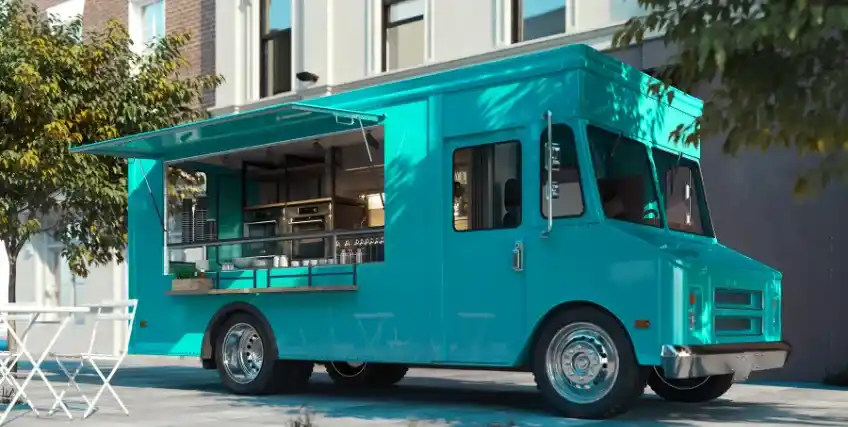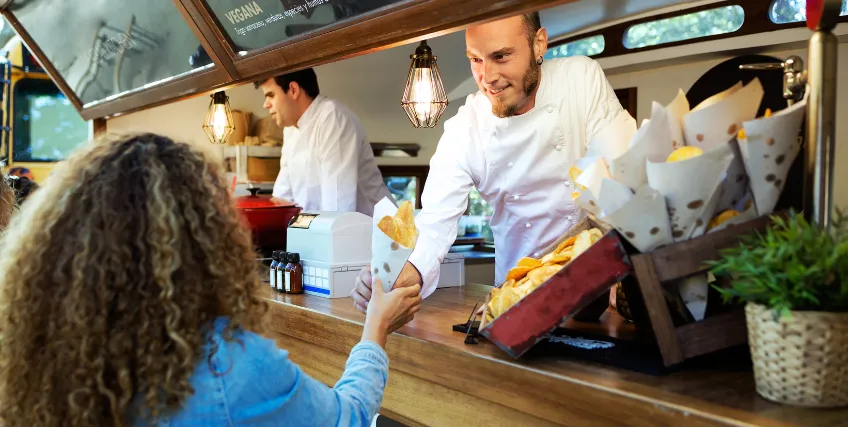From Generators to Grills: Financing Food Truck Equipment with Smart Business Loans
September 1, 2025 | Last Updated on: September 1, 2025

The food truck industry has transformed from a niche side hustle into a booming market. Across the United States, food truck entrepreneurs are serving everything from gourmet tacos to vegan comfort food. According to a report by IBISWorld, the food truck market is expected to generate a revenue of $2.8 billion by 2025 – a number that shows just how strong this segment is becoming.
But here's the problem many food truck owners run into: equipment is expensive. Generators, grills, refrigeration units, and kitchen gear can run into tens of thousands of dollars. Trying to cover these expenses with savings often leaves little working capital for payroll, marketing, or emergencies.
That's where financing steps in. A business loan for food truck expenses allows owners to fund critical upgrades without draining every dollar of cash on hand. Instead of scrambling to cover a huge lump sum, entrepreneurs can spread payments out, keeping operations stable.
This article explores how smart financing – whether through an SBA loan for food truck upgrades, equipment financing, or other business loans – can keep trucks compliant, efficient, and profitable. From cost ranges of common equipment to application tips, we'll cover what every small business owner should know before taking the next step. Put simply, we will explain how a business loan for food truck owners can help keep trucks on the road and businesses profitable.
Why Equipment Matters for Food Truck Success
A food truck isn't just a van with a stove bolted inside. It's a compact business that has to deliver safe, high-quality food in unpredictable environments. Every piece of equipment matters.
Think about refrigeration. Without dependable coolers, compliance with health codes becomes impossible, and spoiled food can wipe out profits in a single day. Or consider a generator. A weak power source stalls your operations, leaving customers waiting and sales slipping away. Even a small issue with grills or fryers can turn into long lines, frustrated customers, and lower revenue.
These realities make equipment less of a “nice-to-have” and more of a necessity. Yet the cost is steep. Commercial refrigerators alone range from $1,000 to over $44,000 depending on size and energy efficiency. For many food truck entrepreneurs, paying that amount upfront isn't realistic.
Here's where financing comes in. By using a business loan for food truck expenses, owners don't have to cut corners. The right financing options mean you can buy reliable gear today and pay it off in manageable installments. An SBA loan for food truck operations or a simple equipment financing plan ensures compliance with regulations, protects food quality, and helps maintain cash flow.
In short, equipment isn't just another line item. It's the backbone of a successful truck. And securing a business loan for a food truck makes it possible to keep that backbone strong without draining every cent of working capital.
Common Equipment Food Trucks Need
Running a food truck means running a mobile kitchen. To stay profitable and compliant, certain equipment is simply non-negotiable. Here are the essentials most owners invest in:
- Generators: A reliable generator powers everything – from lights to grills. Prices typically range from $500 to $3,000, depending on wattage and durability. However, some can be priced outside of this range based on which model you buy.
- Commercial Grills & Fryers: They're the heart of fast service. Expect to spend $1,500 to $8,000 depending on the size, brand and features for durable, commercial-grade models. A business loan for food truck equipment spreads these costs over time.
- Refrigeration & Freezers: Food safety depends on proper storage. Units can cost anywhere from $1,000 to $55,000 or more. Many owners rely on food truck equipment financing to avoid large upfront payments.
- Ventilation Systems: Adequate airflow keeps kitchens safe and compliant with fire codes. These setups usually cost $1,000 to $3,000 or more and are often included in equipment loans.
- Point-of-Sale (POS) Systems: Accepting cards and mobile payments isn't optional anymore. A system costs $1,200 to $6,000, but financing makes it an easy add-on.
- Safety Gear: Fire suppression systems, extinguishers, and first-aid kits are required by law in most states. Skipping them risks shutdowns and lawsuits. The total cost depends on your volume, complexity, and contract terms.
Every one of these purchases keeps trucks running smoothly. And for a small business with limited cash, a business loan for a food truck offers the flexibility to buy what's needed without wiping out working capital.
How a Business Loan for Food Truck Owners Works
So, what happens when you take out a business loan for food truck equipment? In most cases, it's about turning a huge upfront cost into predictable, manageable payments.
Say you need $15,000 for a new generator and upgraded refrigeration. Instead of draining your savings, a business loan for a food truck covers the purchase right away. You then pay the loan back over time, usually in monthly installments. That way, your truck keeps rolling while your cash flow stays steady.
There are different formats. With a term loan, you get a lump sum upfront and repay it over a set period. An equipment loan is tied to the gear itself, meaning the lender uses the equipment as collateral. This often leads to lower interest rates and better eligibility for borrowers.
Some food truck financing options even allow seasonal repayment adjustments. That flexibility is huge when sales dip in colder months.
The real benefit is peace of mind. Financing lets you keep working capital available for payroll, inventory, or emergencies instead of locking it all into one purchase. It also helps build your business credit, improving future eligibility for larger small business loans.
Spreading costs with financing is one of the smartest ways for entrepreneurs to grow without overextending themselves. For food truck owners, it's less about taking on debt and more about staying financially nimble.
Types of Business Loans for Food Truck Owners
Not every financing option works the same way. Choosing the right one depends on your credit history, business plan, and equipment needs. Here are the most common ways food truck entrepreneurs secure funding:
1. Traditional Bank Loans
Banks are the classic route. They usually offer lower interest rates and longer repayment terms, but approval can be tough. Strong financial statements, a good credit score, and collateral are often required. Many business owners find this path slow but reliable.
2. SBA Loan for Food Truck
Backed by the Small Business Administration, these loans are attractive for startups and existing businesses alike. Programs like SBA 7(a) and microloans cover truck purchases, upgrades, and kitchen equipment. They come with favorable terms and lower interest rates, but the application process can take time.
3. Equipment Financing
With this option, the equipment itself secures the loan. It's a popular pick for food truck equipment financing since lenders face less risk. This can help even those with weaker credit qualify. Repayment terms usually match the equipment's useful life.
4. Business Line of Credit
Instead of one lump sum, you borrow as needed up to a limit. Interest applies only to what you use. Perfect for repairs, POS upgrades, or small kitchen equipment purchases. It gives flexibility without locking into a large loan amount.
5. Alternative Online Financing
When traditional banks say no, online lenders step in. Decisions are fast, and requirements are less strict. The tradeoff? Higher interest rates and shorter terms. Still, for a new food truck or someone with bad credit, this can be a lifeline.
Each option has pros and cons. The right business loan for food truck depends on your working capital needs, eligibility, and growth forecasts.
Benefits of Using a Business Loan for Food Truck Equipment
Taking on financing might feel intimidating, but for many owners, it's actually the smartest move they make. A business loan for food truck equipment offers advantages that go way beyond just covering costs.
- Preserve Working Capital: Instead of emptying savings for one big purchase, you keep funds available for payroll, marketing, or emergencies.
- Access to Modern Equipment: Newer grills, refrigeration units, and generators improve efficiency and keep you compliant with safety codes. That translates into faster service and happier customers.
- Spread Out Large Expenses: Paying $10,000 upfront can crush cash flow. A business loan for a food truck turns it into manageable monthly installments.
- Build Business Credit: Responsible repayment strengthens your credit score and history if the lender reports to credit bureaus, which opens the door to future small business loans on better terms.
- Boost Revenue Potential: Fewer breakdowns and faster service usually mean more customers. Better equipment helps owners maximize daily sales.
- Flexible Repayment Options: Some financing options offer seasonal adjustments, which is a relief when business slows during colder months.
It has been noted that financing often provides long-term value by allowing businesses to grow strategically rather than reacting to immediate cash shortages. For food truck entrepreneurs, that flexibility is often the difference between running a business that just survives and one that truly thrives.
At the end of the day, a business loan for food truck upgrades isn't just about getting equipment; it's about buying stability, efficiency, and growth.
Things to Consider Before Applying
Before jumping into the loan process, it's smart to pause and check a few things. Not every business loan for food truck applicants will qualify the same way, and preparation can save time and money.
1. Credit Score & History
Your credit score plays a big role in loan approval. A strong history usually leads to lower interest rates and better loan terms. But if you've got bad credit, don't panic. Some food truck financing options still exist through alternative platforms.
2. Revenue & Cash Flow
Can your food truck business comfortably handle monthly repayments? It's not just about today's numbers. Look at forecasts, seasonal dips, and unexpected costs. Lenders want to see consistency in annual revenue and cash flow.
3. Loan Terms & Interest Rates
Every loan is different. Pay attention to repayment terms, fees, and penalties. The right business loan for a food truck should help, not strain, your finances.
4. Required Documentation
Be prepared to share tax returns, financial statements, and even personal credit details if you're running a startup or new business. A strong business plan with projections can make all the difference in approval.
5. Collateral Considerations
Some loans, like equipment financing, use the gear itself as security. That lowers risk but means repossession if payments aren't made.
Conclusion
Running a food truck is exciting, but it's also demanding. Equipment isn't just an accessory; it's the core of the entire operation. Without a strong generator, safe refrigeration, or efficient grills, even the best recipes can't reach customers the way they should. The costs are steep enough to put a dent in any small business budget.
That's why using a business loan for food truck equipment can make sense. Instead of draining savings or juggling credit cards, entrepreneurs can rely on structured financing. Whether it's an SBA loan for food truck purchases, a dedicated equipment loan, or even a flexible line of credit, financing gives owners breathing room. It keeps working capital available for payroll, marketing, and emergencies while still allowing for upgrades.
For many food truck owners, the payoff is clear: smoother operations, stronger compliance with regulations, and more consistent profits. As trucks get busier and competition grows, having reliable equipment isn't optional; it's survival.
At the end of the day, a business loan for a food truck isn't just about borrowing money. It's about investing in the long-term success of your business. From generators to grills, financing keeps food trucks on the road and serving customers.
FAQs on Business Loan for Food Truck to Finance Equipment
1. What may be considered as the best financing option for a food truck owner?
The best choice depends on your needs. Many entrepreneurs use an SBA loan for food truck upgrades, while others prefer equipment loans or a flexible line of credit.
2. Can I use a business loan for food truck equipment only, or for other expenses too?
A business loan for a food truck can cover equipment, working capital, marketing, payroll, or even repairs. Some loans are specific to equipment financing, others are more flexible.
3. Do I need perfect credit to qualify?
While a higher credit score helps secure lower interest rates, alternative lenders and equipment financing options often approve owners with fair or even bad credit.
4. Can I use an SBA loan for food truck startups?
The Small Business Administration offers microloans and 7(a) loans that are commonly used by startups and small business owners entering the food truck industry.
5. What documents are required for the application process?
Most lenders will ask for tax returns, financial statements, forecasts, a business plan, and sometimes personal credit details, especially for startups.
Frequent searches leading to this page
Term Loans are made by Itria Ventures LLC or Cross River Bank, Member FDIC. This is not a deposit product. California residents: Itria Ventures LLC is licensed by the Department of Financial Protection and Innovation. Loans are made or arranged pursuant to California Financing Law License # 60DBO-35839




